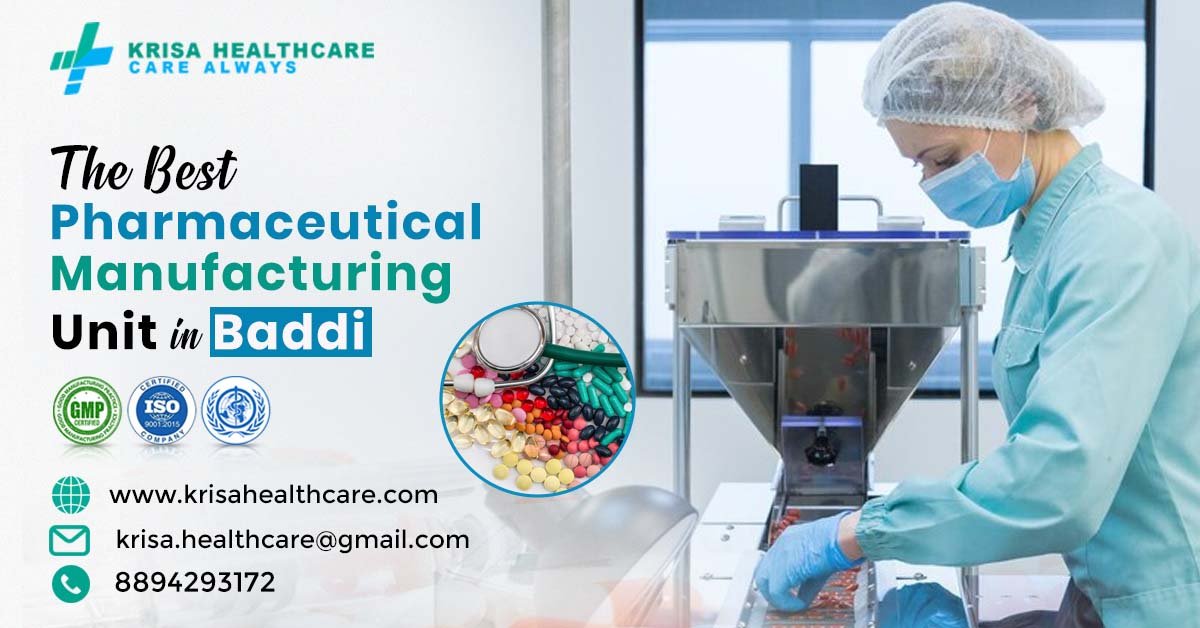Pharmaceutical Manufacturing Unit in Baddi – A successful pharmaceutical industry depends on highly advanced manufacturing units to produce quality-assured medicines that conform to regulatory standards. The pharmaceutical manufacturing unit is essential for the accuracy and consistency of large-scale drug production processes. They have modern equipment and are under strict quality control procedures to produce products that comply with international guidelines, such as Good Manufacturing Practices (GMP) and the World Health Organization (WHO).
For example, Krisa Healthcare prioritizes product quality by constantly upgrading its pharmaceutical production unit in Baddi to the latest standards, which helps it meet the fast-increasing demand for a variety of pharmaceutical products.
Key Components of a Pharmaceutical Manufacturing Facility
A pharmaceutical manufacturing facility in Baddi must be properly operating in several fields to guarantee the company’s product innovation, safety, and effectiveness. Here are the main elements that the success of these facilities can be ascribed to:
– Compliance with Regulations: Disciplined compliance with Good Manufacturing Practices (GMP) and WHO standards guarantees products meet the quality and safety benchmarks.
– Advanced Equipment and Technology: The company uses automation and top-notch machines to reduce human errors and improve the efficiency of operations.
– Quality Control: High-quality assurance requirements, including line testing and real-time monitoring, help maintain product consistency across batches.
Benefits of a Pharmaceutical Production Unit
A pharmaceutical production unit is relevant in the healthcare sector because it can produce a wide range of medicines and healthcare products. Its main benefits include:
– Scalable Production: The ability to adjust operations based on the market demand gives room for better resource utilization.
– Efficient Supply Chain: Timely access to raw materials supports the production cycle and ensures continuous medicine production.
– Cost Savings: High-tech equipment and correctly configured processes can thus be utilized to reduce operational costs for both manufacturers and customers.
– Customization: Facilities can very well process orders tailored to the client, thus enabling them to satisfy their specific needs.
Why is Third-Party Manufacturing Gaining Popularity?
Several companies now favour a third-party pharmaceutical manufacturing facility due to the benefits they provide. These units allow a business to have the production done outside and then focus on more important things.
– Reduced Investment Costs: The investment required to purchase the manufacturing equipment can be completely avoided if you outsource.
– Regulatory Compliance Knowledge: Third-party manufacturers possess in-depth knowledge of the regulatory requirements and the products they produce strictly meet all the required standards without any issues.
– Faster Time to Market: The long-running pharmaceutical contract manufacturing facilities can bring products to market faster through their acquired know-how and resources.
Why Choose a Reliable Pharmaceutical Manufacturing Unit?
The primary considerations when choosing a pharmaceutical company to produce medicines are reliability and quality. The following are the main aspects that need to be considered to ensure a trustworthy manufacturing partner is selected:
– Proven track record: Ensure the facility has continuously produced high-quality products in different therapeutic areas for a long time.
– Commitment to Innovation: Look for those who allocate funds to R&D to maintain a competitive advantage over their rivals and technology.
– Flexible Production Capabilities: If you want mass production or need fewer pieces, the pharmaceutical production unit should have a solution to fit your requirements.
Conclusion
In the current pharmaceutical market, collaborating with a highly efficient and trustworthy pharmaceutical manufacturing facility is important for the timely production of high-quality medications. The right partner, such as Krisa Healthcare, will assure you that your product’s quality and regulatory standards will comply with the regulations. However, it will be in the form of scalable and inexpensive solutions. A pharmaceutical manufacturing unit in Baddi contributes to the development of healthcare solutions through technology and knowledge.
Frequently Asked Questions
Q1. What are the common challenges faced by pharmaceutical manufacturing units?
Ans. The usual problems include regulatory compliance, quality variation, supply chain management, and keeping the production sterile.
Q2. How is quality control maintained during the production process?
Ans. Quality control is done by strict testing at the different stages of the production process, such as raw materials, in-process checks, and finished product testing.
Q3. What is the difference between pharmaceutical manufacturing and pharmaceutical compounding?
Ans. Pharmaceutical manufacturing implies the mass production of uniform drugs, whereas compounding is the process of formulating specific medications for a particular patient.
Q4. How are pharmaceutical products packaged in manufacturing units?
Ans. The packing process is carried out in clean surroundings. A few methods include blister packs, bottles, and vials.
Contact Details:
Company Name: Krisa Healthcare
Address: Plot No 6,
Apparel Park Cum Industrial Area,
Katha, Baddi-173205 (H.P.)
Phone: +91-835-1803-187, 889-4293-172
Email-id: krisa.healthcare@gmail.com


